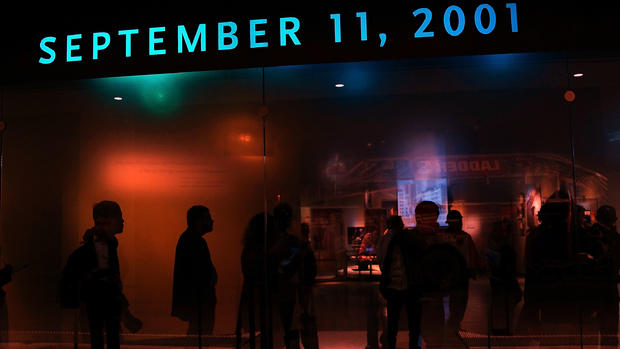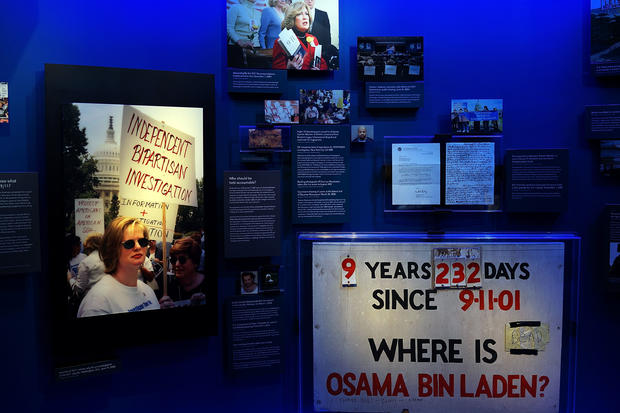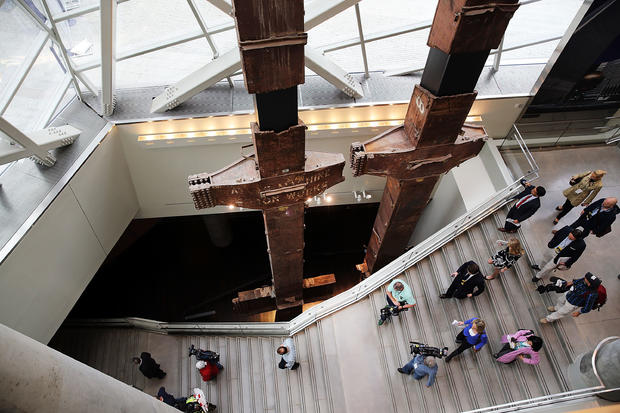Visit to 9/11 museum may be cathartic for some; traumatic for others
NEW YORK - More than 13 years after the attacks of Sept. 11, the completed museum at the World Trade Center site opened its doors. The collection of artifacts, pictures, videos and stories of victims fill the museum - a Pandora's box of memories that pay tribute to the tragic events that unfolded in lower Manhattan, as well as Washington D.C. and Pennsylvania, on that terrible day.
Inside the 9/11 Memorial Museum, dedicated to all who died in the attacks, museum-goers will find steel from the South Tower, the wrecked remains of a fire truck, the last piece of ruins removed from the site, a pair of bloody high heeled shoes and wallets carried by those who were lost. There are missing-person photos on the walls and recorded voices of victims who made their last phone calls to say goodbye to spouses, children, siblings and friends.
For many people, bearing witness to the traumatic events laid out in the museum will be too much. For others, it may feel cathartic, says Dr. JoAnn Difede, director of the Program for Anxiety and Traumatic Stress Studies at New York-Presbyterian Hospital/Weill Cornell Medical Center.
"There's not a uniform psychological impact of the museum or even the location. The museum is a memorial to those who passed away as well as the ones who survived and are still struggling today," Difede told CBS News. "Reviewing artifacts, pictures, items from that time allow people to emotionally process the event further and integrate a memory and move on with their lives."
Difede, who has worked extensively with 9/11 victims and first responders, added at least 16 percent of 9/11 victims still experience some form of post-traumatic stress disorder, many of whom don't realize they are still struggling. A visit to the museum may be hardest for those victims.
"Since it's in a museum though we have a choice to bear witness and see it and absorb and go on as we see fit or not," she said. "I think the worry that it's going to be too overwhelming is meant to be tempered with the idea that it's meant to be a healing environment and a healing experience and we each have the option to view certain artifacts or not view them."
A psychologist who worked with the lead design firm for the museum, said they were aware of the possible effects of the exhibit.
"To the extent that one is bringing the past back into the present, it can be a difficult experience," said Dr. Billie Pivnick, consulting psychologist to Thinc Design, the lead design firm for the museum.
"We've given people choices about how they approach those areas," said Dr. Pivnick. "So some people can stay more on the periphery and just stick with the facts. Some people can go deeper into the exhibits and deal with some of the more difficult materials like photographs of the people who jumped from the buildings or audio recordings of the people's voices."
The widow of a man killed on 9/11 said she was okay with her personal story being told at the museum, which she worked on.
"The day my husband died was the day he became part of the world. This is his story," Monica Iken, whose husband Michael was killed that day.
"I don't have a problem sharing him with the world. I want everyone to know why I did this for 13 years, almost. Why I worked on this memorial and museum and why I'm so proud of all the souls who are now finally home and sharing them with the world."
Charles G. Wolf lost his wife Katherine, who worked on the 97th floor of Tower One.
"It's just amazing what you see down there. Absolutely amazing. And at the same time it's very very personal, extremely personal," said Wolf. "Someone like me has waves of emotion that come over me ... You never know when it is going to hit you."
Research has found many who experienced 9/11 from a distance, through around-the-clock news coverage, have had many of the same psychological experiences as those who lived through it. Those reactions have included post-traumatic stress disorder, depression and anxiety. Even some who are probably too young to really remember the events.
In one study, published in the Journal of Traumatic Stress, researchers analyzed brain waves of college students in Boston while they were shown photos, some of Sept. 11 and others that were not related. They found different brain activity when study participants saw the Sept. 11 photos.
Difede says anyone who decides to attend to the museum should prepare themselves for the aftermath of the visit.
"Each individual should think about how they cope with a difficult experience and one in which they're sad, one in which they might be angry, experience loss or healing environment and expect that going to the museum may be a similar experience," she said.
Dr. Pivnick said the museum focus is on healing.
"The thing that's most healing when someone has been traumatized or deeply distressed is what we call being witnessed, having someone who cares to listen, who cares about their story and about what they went through. It's the caring that really matters.
" The museum is a place to create an experience like that where it's relatively safe and people can come together and show solidarity with one another."


